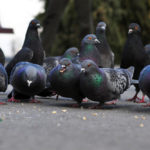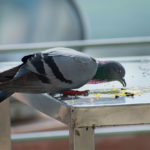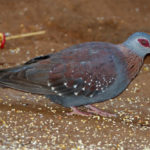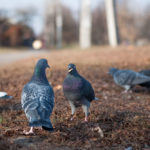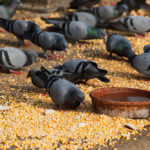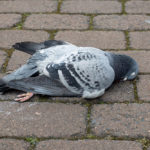On the streets and in large cities, you often see pigeons eating anything they come across and can get their beaks on.
However, if you’re considering keeping a pigeon as a pet and you want to gain a better understanding of what they eat, you’ve come to the right place.
In this article, I will cover some key information about a pigeon’s diet, including what pigeons eat as pets and what they eat in the wild.
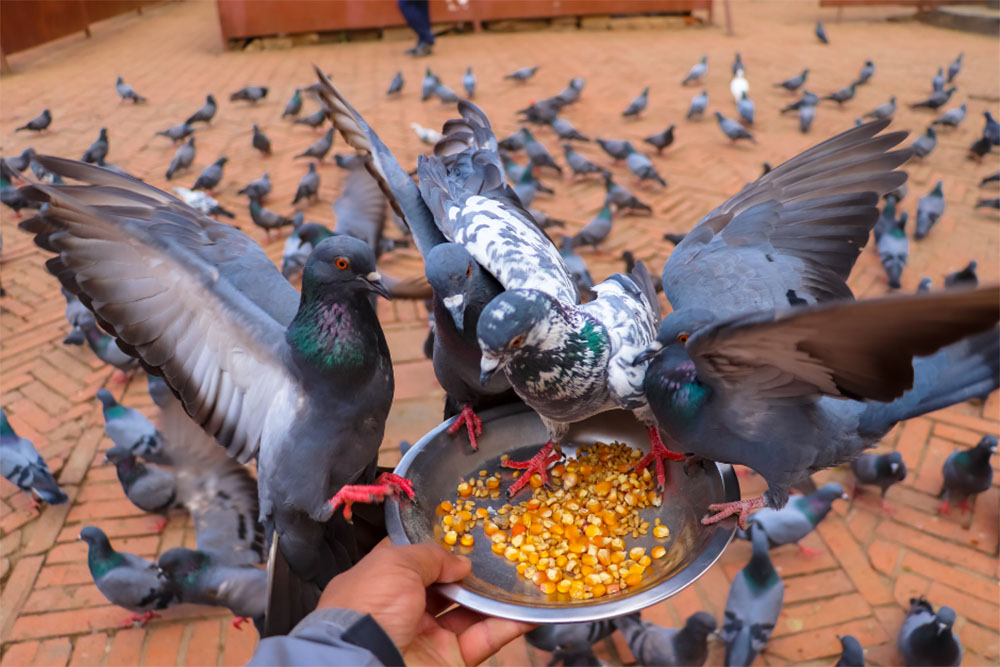
Keep reading to find out more.
What Do Pigeons Eat As Pets?
Pigeons aren’t fussy eaters, and will eat pretty much anything that you put in front of them.
However, to ensure that they remain healthy, you will need to consider the foods that are best suited to their health and development.
Traditionally speaking, pigeons have exclusively been fed an all-seed diet. However, commercial seeds are high-fat and can be nutrient-deficient if you feed your pigeon seed exclusively.
This comes down to the fact that commercial seed is different from the seeds that wild pigeons find.
There are many foods that are safe for a pigeon to eat to ensure that they receive a balanced diet.
There are numerous commercial pigeon pellets that are designed to meet their nutritional needs. You will be able to find these pellets either online or in store at your local pet store.
However, when you’re keeping them as pets, their diet shouldn’t just consist of pigeon pellets, but it should also contain seeds and fresh produce.
For context, pigeon pellets should make up around 50% of your pigeon’s daily diet.
Seeds are also good to feed your pigeon. However, they are better to supplement their diet as opposed to them having to rely on them significantly.
This is simply because commercial seeds can lack the nutrients that pigeons need to remain as healthy as possible.
Your pigeon’s diet will need to be partly made up of fresh produce.
This includes finely fresh fruit and vegetables such as berries, sugar snap peas, cauliflower, leafy greens, and more.
That being said, you should avoid fresh produce with a high water content, such as celery and lettuce, as this won’t offer your pigeon the nutrients it needs.
When it comes to feeding your pigeon fresh produce, you will need to ensure that you are thoroughly washing the fruit and vegetables beforehand.
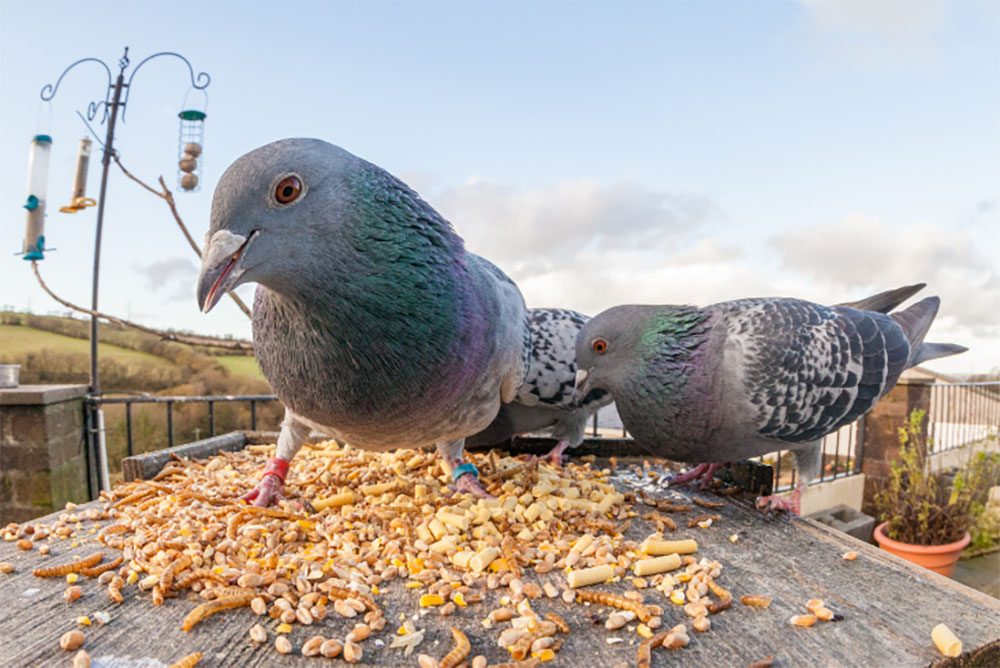
This will make sure that any chemicals or pesticides have been cleaned off before you feed your pigeon the food.
You should always offer fresh produce in bite sized pieces that are easy for your pigeon to chew and digest.
If you fail to do this, it could result in a choking hazard or your bird becoming very sick if their digestive tract becomes blocked.
They require fresh food and water every single day.
Depending on the quality of your tap water, you might want to consider feeding your pigeon bottled water.
If there is food left over in the evening, it is a sign that you are overfeeding your pigeon.
This will need to be adjusted in order to prevent you from wasting more food in the future or overfeeding your bird so much that they begin to put on weight.
For years, it’s been understood that grit should be a part of a pigeon’s diet to help them digest their food.
However, there is a large amount of controversy that surrounds grit and what can happen if you provide your pigeon with too much of it.
As a result, you can offer your pigeon crushed eggshell over their food as an alternative every now and then, which provides an extra boost of calcium to their diet.
That being said, their pellets should be of a high enough quality that your pigeon’s food is well supplemented with vitamins and minerals.
It is also important to note that your pigeon pellets, fresh produce, and freshwater should be given to your pigeon in separate bowls.
This will allow them to chew and digest their food appropriately. There’s no getting away from the fact that pigeons can be messy creatures.
You will need to make sure that you’re cleaning their food bowls thoroughly every day. To do this, wash them with soap and hot water and allow them to try before placing more food in them.
To make sure you’re feeding your pigeon the right type of foods, it’s crucial that you consult with a veterinarian to discuss their nutritional needs.
This is especially important when you first bring your pigeon home, but also if they have changes in eating habits.
They’ll be able to offer you advice on the best foods to feed your pigeon and can also give you an indication into whether they need to be fed any supplements.
Feeding Schedule
In terms of a feeding schedule, you should feed your pigeon first thing in the morning.
It can be difficult to know how much food to feed them when you first get them, but by the end of the day, there shouldn’t be any food left.
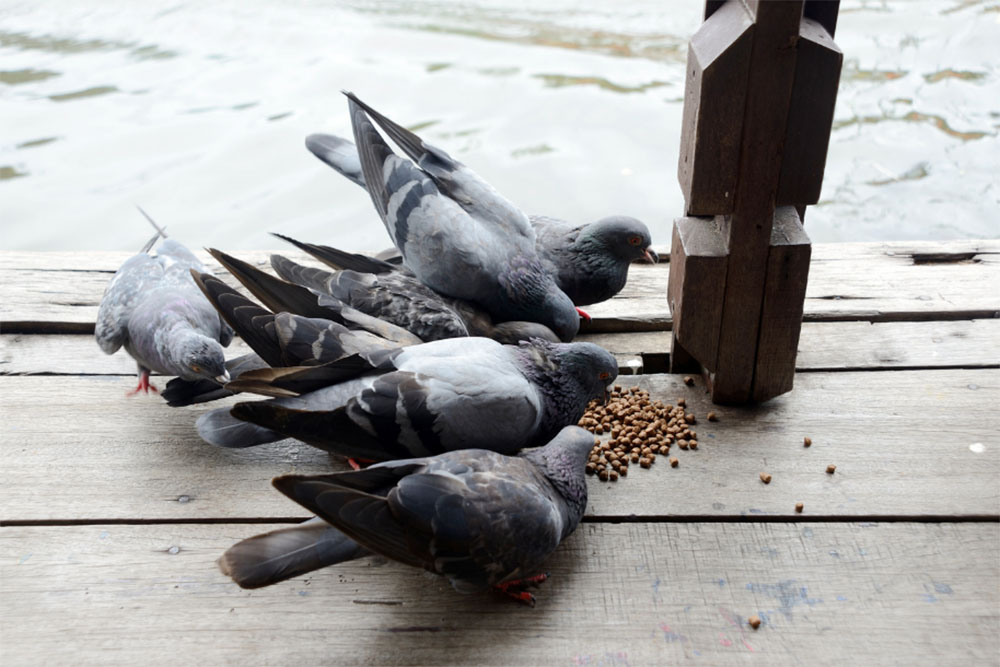
You will need to adjust their food until they are eating all of it by the evening.
It is also good for you to know that your pigeon might develop eating habits.
Although they’ll eat anything in the wild to survive, they might become fussy and prefer certain foods over others when they’re fed in captivity.
If this happens, you will need to reduce the amount of the food that they like the best or stop giving it to them altogether for a while.
This will make sure that they’re giving other foods a fair try and you can slowly reintroduce them back into their diet once their fussy tendencies have subsided.
What Do Pigeons Eat In The Wild?
As I’ve mentioned, pigeons aren’t fussy. In fact, they can get themselves into trouble scavenging through trash cans when they’re desperate for food.
Pigeons eat pretty much anything they come across in the wild. This includes seeds, grains, berries, fruits, and fresh greens. Pigeons also eat grit for digestion purposes.
Although pigeons are natural herbivores, they will eat almost anything that they can find if necessary.
This means that they will also feed on creepy crawlies that they come across, such as grubs, insects, earthworms, mealworms, waxworms, and snails that they find on the ground.
However, it’s important to note that pigeons in the wild can often struggle to find food, and often have to resort to scavenging and eating foods that aren’t suitable because of this.
Pigeons need help with their food supply during the harsher months of winter. If you have pigeons that flock to your backyard during these months for food, you can help them in a variety of ways.
Leaving pigeons suet balls that contain a decent amount of fat helps them to survive the cold during the winter.
You can also leave canned pet food, such as dog or cat food to help them through these tough conditions.
It’s also worth noting that as well as winter, there are often food shortages during wetter periods. This includes warmer seasons, such as during spring.
For the pigeons in your yard to survive, they often need additional help throughout these seasons in order for them to thrive.
However, you will want to make sure that they eat during the early morning hours to ensure that they remain healthy.
What Do Urban Pigeons Eat?
The variety of foods that urban pigeons eat is endless, as they mainly survive on the scraps left by humans.
Unfortunately for urban pigeons, they don’t come across food that is suitable for them nearly as often as wild pigeons do.
These foods can include bread, pasta, meat, fish, and also confectionery, which can lead them into all sorts of trouble. Pigeons shouldn’t eat chocolate, as this can be highly toxic to them.
That being said, they are creatures that are desperate for food, and will often eat whatever they come across to fill their stomachs.
In the majority of cases, this food is likely contaminated with food that can hurt their digestive system and can even be fatal.
Bearing this in mind, you might want to leave out food that is suitable for pigeons to help them through the tougher months where food is scarce.
Can Pigeons Eat Human Food?
As I’ve mentioned, pigeons are scavengers, and eat human food all of the time.
However, there are human foods that are more suitable than others, and some that should be avoided at all costs because they’re toxic.
Some pigeons might enjoy a small amount of lean meat or fish that has been cooked.
That being said, if you’ve made dinner and there are left-overs, you can try offering it to them as a little treat to their normal diet.
They can also eat cheese and egg, but these foods should be consumed in moderation.
Birds are lactose intolerant, so you don’t want to be loading pigeons up on dairy products.
What Should A Pigeon Avoid Eating?
Aside from contaminated foods that are left in garbage cans around big cities, there are a variety of different foods that a pigeon shouldn’t eat and could do them harm.
These foods include:
Avocados
Avocados contain persin. When ingested by a pigeon or another bird for that matter, this substance may cause difficulty breathing, weakness, and could even be fatal.
Apple Seeds
While apples are fine for a pigeon to eat, apple seeds contain cyanide that can cause irritation in a pigeon’s gut.
Caffeine
Caffeinated beverages such as coffee, tea, and soft drinks can cause a pigeon’s heart rate to increase and can even lead to cardiac arrest.
Chocolate
Although pigeons will be tempted by the sweetness of chocolate, it can be toxic to pigeons as it contains the compound, theobromine as well as caffeine.
This can induce tremors, an increase in heart rate, and could even be fatal to a pigeon.
Salt
Salty foods contain a lot of sodium which pigeons find difficult to digest, so should always be avoided.
Onions And Garlic
Onion contains sulphur compounds that can irritate and cause ulcers in the pigeon’s mouth.
In Summary
So, there you have a detailed overview of what a pigeon eats. Hopefully after reading this article you have a better understanding of what is suitable and unsuitable for a pigeon to eat.
Like many other birds, pigeons can struggle through the harsher seasons and weather conditions.
If you don’t have a pet pigeon but are interested in helping them out in your backyard, make sure that you do your research and follow this article as a guideline.
You could save their lives by offering them food that is suitable for them to consume, over them having to resort to scraps that could actually kill them.

